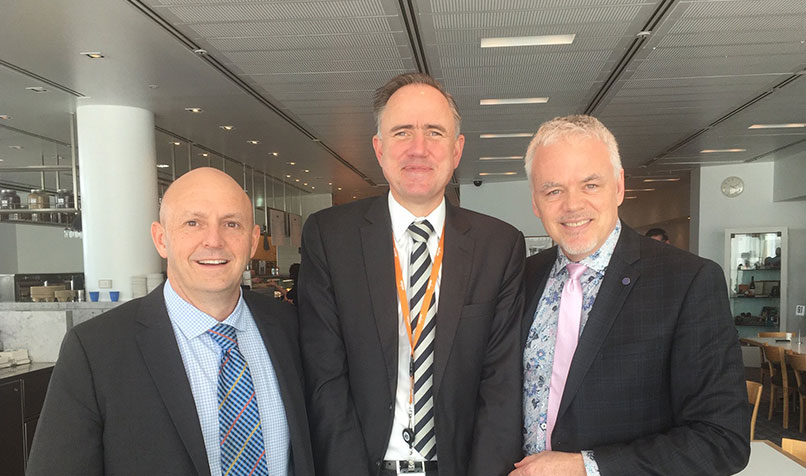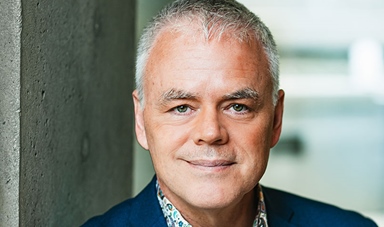Loading component...
At a glance
- Jim Stanford is director of the Australia Institute’s Centre for Future Work.
- Stanford began his career in economics with a commitment to teaching economics in a practical and accessible way.
- Among Stanford’s interests is creating more dialogue around the vital role of government in the free market and in facilitating a healthy economy.
By Johanna Leggatt
Economics, as Jim Stanford laments, is often viewed as the sole domain of money-makers and movers and shakers – those, in other words, who run companies, pick stocks and sit on boards.
This, he believes, is a fundamental illusion, as the scope and application of economics is much wider and much broader.
It affects us all.
“Economics is associated with bean counters or doomsday prophets, but it shouldn’t be,” Stanford says.
“What we are doing as economists is thinking about how human beings can create a life with as much security, comfort, leisure and joy as possible.”
Economics is also often viewed as the “study of greed”, a contention that Stanford, who is the director of the Centre for Future Work, based at the Australia Institute, wholeheartedly rejects.
“If you study the most simplistic free-market textbooks, you will be taught that the average human being is only interested in maximising their utility, or acquiring as much wealth for themselves as they can,” he says.
“The whole theoretical framework of conventional economics is based on that starting assumption, and it is utterly false.”
As Stanford points out, “our ability to communicate with each other, to perform complex tasks, is what unites us, rather than some atavistic greed”.
“My goal is for economics to be informed by a sense of social responsibility that can really make a difference in the world, whether it’s how the labour market works or how we protect the environment,” he says.
Socially responsible approach

Stanford is clearly not your stereotypical economist. He was born in Alberta, in western Canada, where his father worked in the oil industry and his mother was a social worker.
“My father was a business leader with a real sense of social responsibility and an ethic of community service,” he says.
“I became quite concerned with inequality and fairness, and different kinds of social causes.”
He found a natural, if unlikely, home in the study of economics, gaining a bachelor’s degree in economics from the University of Calgary, a masters of philosophy from the University of Cambridge and a PhD in economics from the New School for Social Research in New York.
Stanford’s choice of career path is partly the result of one particularly compelling professor, who inspired him to make economics his life’s work.
“This professor wasn’t a ‘raging leftie’. He was just a guy who believed in debate and presenting ideas, and he taught the introduction to economics in a very unusual way,” Stanford recalls.
“He was focused on the history of thought, and the social and political debates that surrounded economics, and that just nailed it for me.”
Demystifying economics
Stanford began his career with a clear commitment to teaching economics in a practicable and accessible manner.
He started out in Toronto, as an economist with the large trade union Unifor, where he honed his ability to disseminate complex terms into meaningful and digestible knowledge on the factory floor.
“The focus was very much on explaining the concepts in an interesting way, and it was what I referred to as ‘economics of life’,” he says.
In 2008, Stanford published his hugely successful Economics for Everyone: A Short Guide to the Economics of Capitalism, which has been translated into six languages and is now in its second edition.
“I wanted to avoid endless math and technical terms, and explain economics in clear English to relate it to people’s lives,” he says of the book.
“When people think of the economy, they think of the stock market, and frankly that is just a tiny piece, often just a sideshow, of the real economy, which is about people’s jobs and working to make goods and services that are useful.”
"“Governments will need to take a leading role in hiring people directly, initiating investment, directing resources and finding ways to get the economic ball rolling."
That ability to condense and explain information is important for all private and public leaders, Stanford argues.
“All professionals should be able to break concepts down clearly for the average person,” he says.
“Otherwise they have absolutely no hope of [getting people] interested.”
In 2016, Stanford and his family moved to Sydney, where he founded the Centre for Future Work at the Australia Institute think tank.
These days, Stanford divides his time between Vancouver – where his wife works as an academic – and his work at the institute in Sydney.
His influential role at the Centre for Future Work allows him free rein to research trends in work, employment and labour markets.
“It allows me to think outside of the box, rather than respond to the day-to-day needs of an organisation, which is what I have done in previous roles,” he says.
Stanford is also a Harold Innis Industry Professor (fractional appointment) at McMaster University in Canada, and an honorary professor in the department of political economy at the University of Sydney.
Role of government debt
Chief among Stanford’s interests is the role of government in the free market.
The pandemic, he argues, has reminded us of the essential role of government in facilitating a healthy economy, which is easy to forget in times of plenty.
“There is this myth that the economy is some spontaneous, private activity, and government just gets in the way,” he says.
“That is historically false and, in fact, the capitalist economy has always relied on the central role of the government in enabling it.”
In the wake of the pandemic, many economies were boosted by national stimulus measures, and this will be the key to global recovery for many years to come, Stanford says.
We need to recognise that governments will need to take a leading role in hiring people directly, initiating investment, directing resources and finding ways to get the economic ball rolling,” he says.
Many economic commentators are worried about the amount of money governments are spending on boosting economies, but Stanford believes the obsession with achieving government surplus, particularly in Australia, is based on a false understanding of economics.
“Debt is considered a normal part of the corporate world,” he says.
“If you were a CEO of a major business, and you told the AGM of shareholders that you were getting rid of all of the debt of the corporation, then you would be out the door, because shareholders know a good way to make more money is to borrow money and invest it.”
Chance for change

Naturally, the pandemic has also exposed some long-standing faults in how we organise our work lives and economies, and Stanford argues that we have a chance for a meaningful re-design.
Research by the Australia Institute has revealed that non-standard employment – casual, contractors, part-timers and marginal self-employment – accounts for roughly half of all employment in Australia.
“Insecure work has cost lives [during COVID-19], and one of the outcomes of the pandemic may be that it will force us to start treating employees like human beings rather than disposable, productive inputs,” Stanford says.
“It may force us to take better care of people such as [ride-sharing] drivers, aged care workers and nurses on the frontline.”
In any case, the profit motive and a happy workforce can – and must – go hand in hand.
“It’s important that business be embedded in a very clear structure of rules, expectations and cultural norms, so that business pursues profit in a way that is constructive,” he says.
Many workers are concerned about the impact of technology on jobs, and while many of these fears are misplaced, Stanford believes the solution lies in giving workers a voice in how change is implemented.
“A way to counter those misconceptions, and a way to ensure the benefits of technology are shared evenly, is to give workers more say in how tech is implemented and how things are automated,” Stanford says.
Finding new ways to redress the “unilateral decision-making power of employers” and provide a more balanced and consultative approach to making decisions in workplaces will serve us well, “not just in protecting workers, but in building a more effective and inclusive economy”, Stanford says.
Innovating locally
What we can learn from Singapore
A strong local manufacturing sector is important to staving off future economic shocks, according to Jim Stanford, and it must be a central pillar of government policy.
“Local manufacturing will offer more stability in a world that is going to be more unstable for years to come for many reasons, including protectionism and trade policy shifts globally, but also environmental and technological shifts,” he notes.
This, however, should not reflect a rejection of globalisation.
“Essentially, you want to sell specialised versions of products to other countries and buy specialised versions of other products from other countries,” he says.
Stanford cites the example of Singapore, which offers a strong and innovation-intensive manufacturing sector.
Singapore, he notes, devotes public equity capital to industries that will be “important to the qualitative development of Singapore’s economy, including manufacturing”.
“Singapore uses more robots, relative to their industrial workforce size, than any other country,” Stanford says.
“They have embraced modern, high-tech, export-oriented manufacturing as critical to their success, and I think Australia could learn a lot from their model, frankly.”
In contrast, the development and application of new technology by Australian employers is slowing down, not speeding up, according to the Australia Institute’s 2020 report, The Robots are NOT Coming.
“The fact that investment in new technology... has been historically slow for most of the past decade reflects a broader failure of the Australian business sector to innovate, accumulate capital, create jobs and advance living standards,” the report states.

